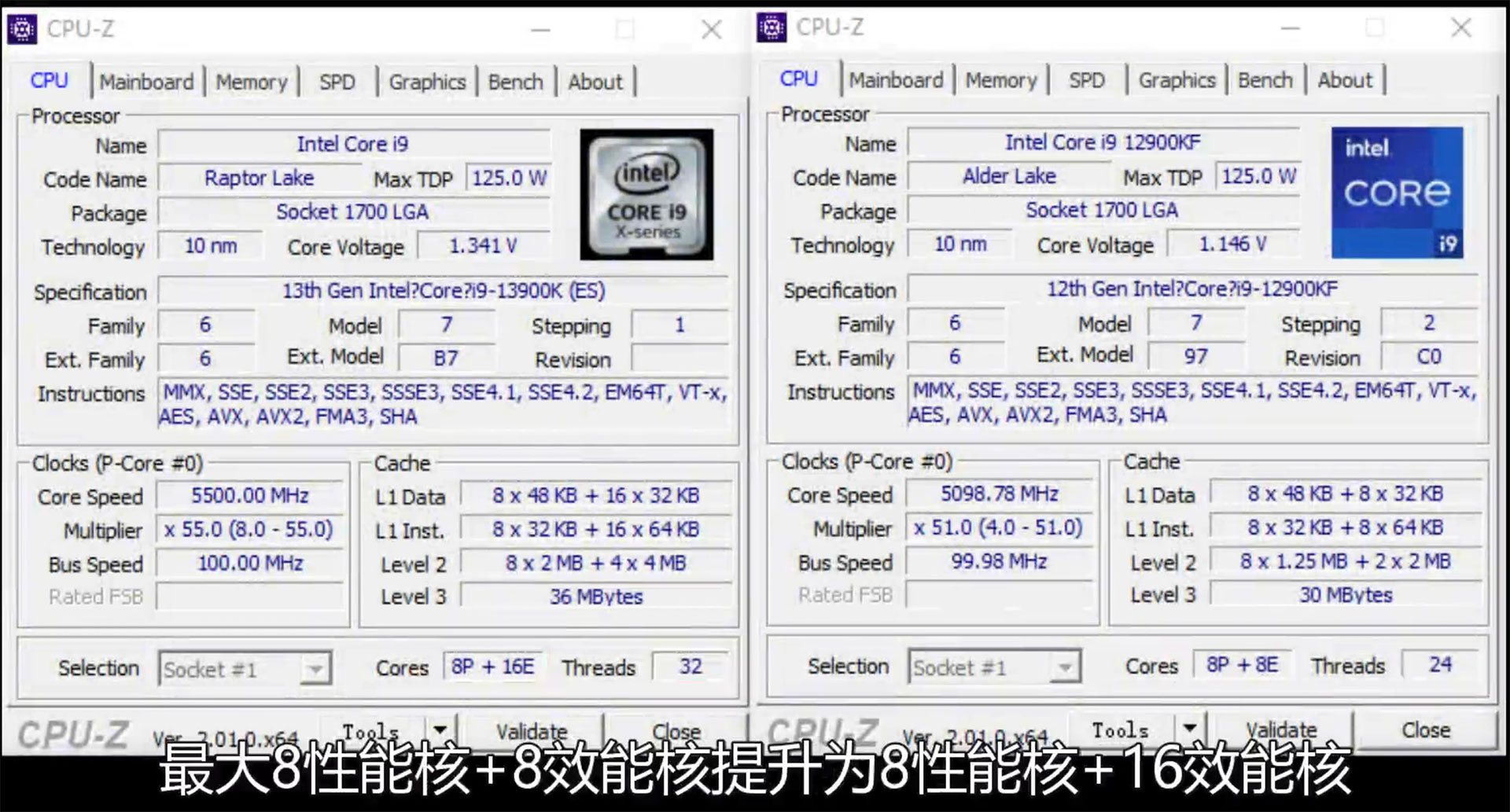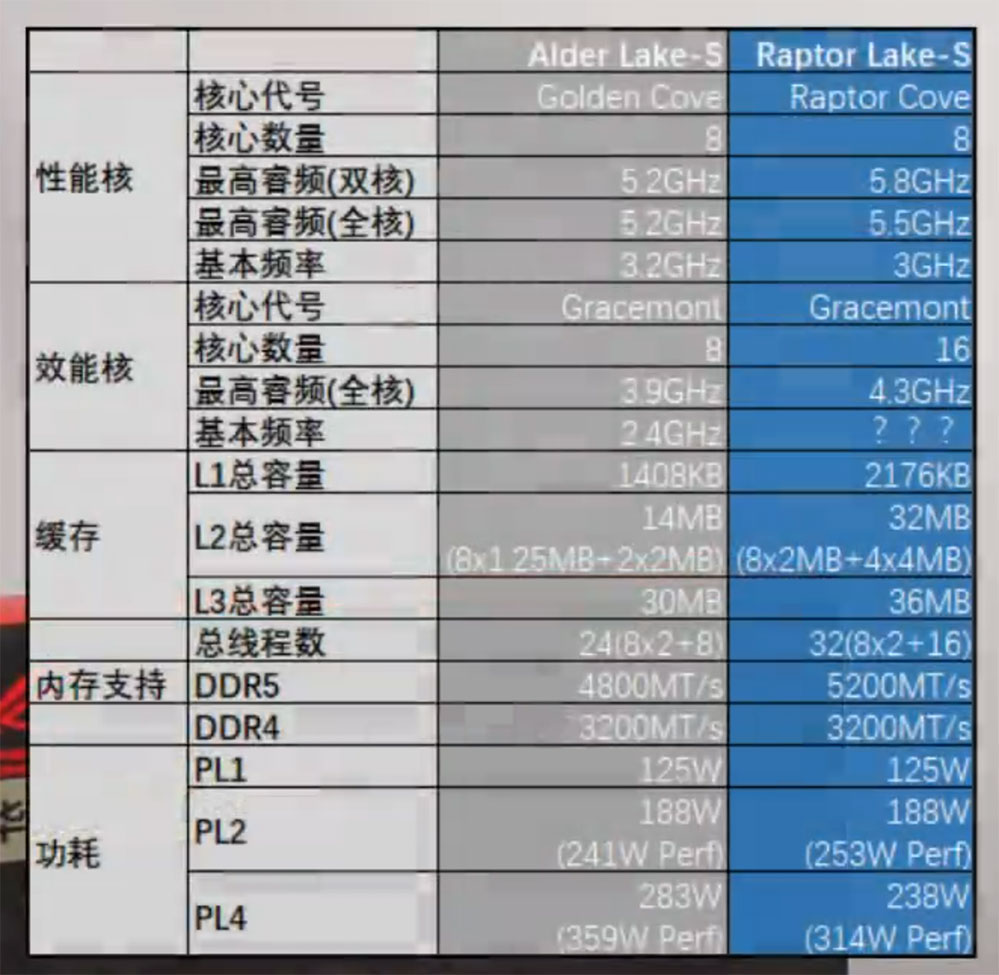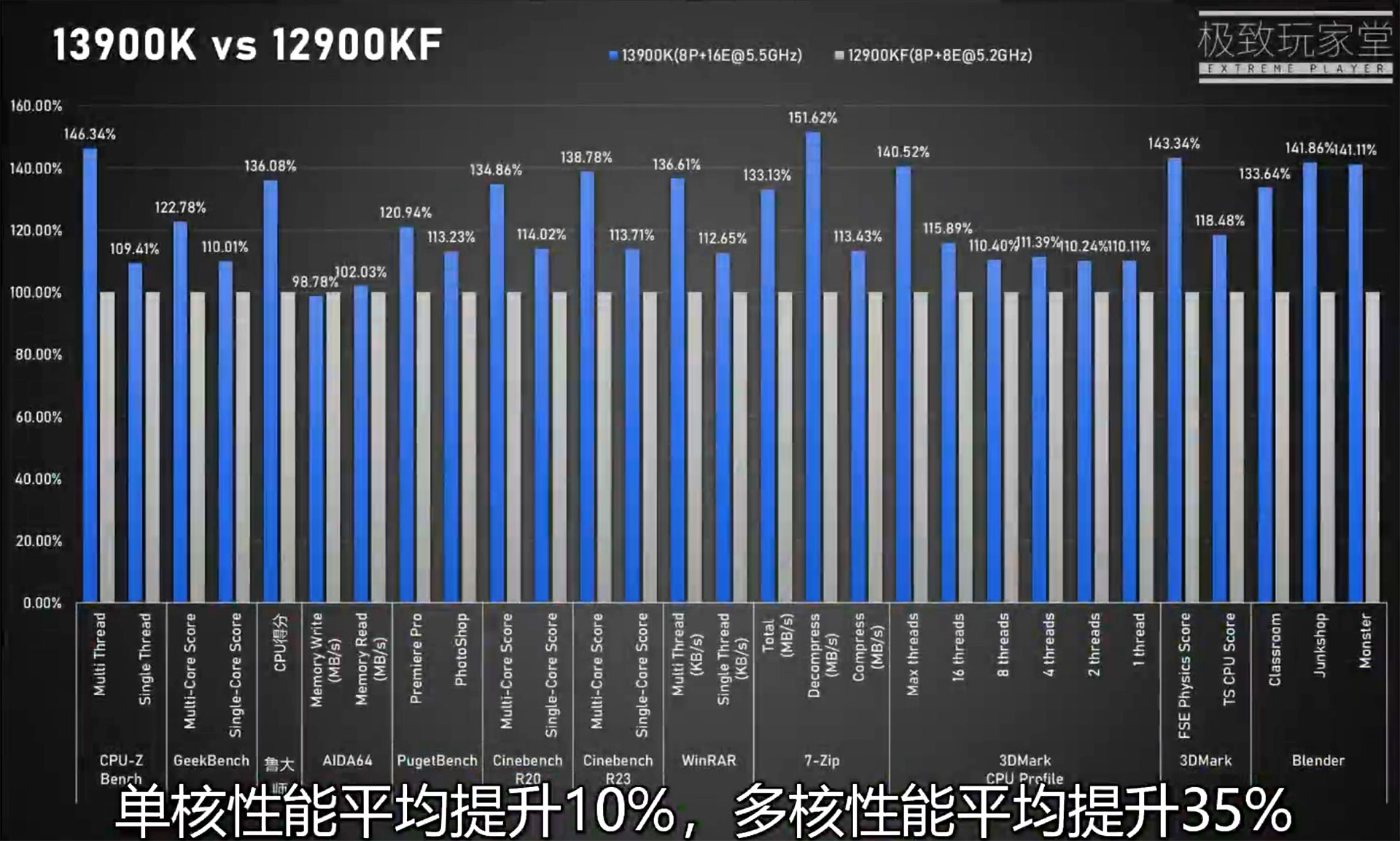Intel Core i9-13900K Benchmarked in Chinese Video, Delivers 10-35% Perf Increase
This Raptor Lake QS CPU appears to have a 5.8GHz dual core turbo clock.
A purported Intel Core i9-13900K has been reviewed, with comparative benchmarks, on a Chinese social media video platform. In the tests, it manages to pull ahead of its Alder Lake predecessor by on average 10% in single-threaded workloads and 35% in multi-threaded workloads.
According to the Bilibili video by Extreme Player, the Raptor Lake chip under scrutiny appears to have Performance cores (P-cores) with a base clock of 3.0 GHz, an all P-cores turbo clock of 5.5 GHz, and a dual-P-core turbo speed of 5.8 GHz. The chip, which is compared directly against an i9-12900KF, is said to be a QS (Qualification Sample) version, which is a significant step closer to being ready for consumers compared to earlier engineering samples.


Before we get into the handful of benchmarks undertaken by Extreme Player, check out the CPU-Z screenshot comparison between the two contenders. They both shared the same platform, for the best like-for-like comparison possible, with the major performance components beside the CPUs being; an Asus ROG Maximus Z690 Extreme, an Nvidia GeForce RTX 3060 Ti, DDR5-6400 RAM, an a 1TB NVMe SSD.
|
Benchmark |
Core i9-12900KF |
Core i9-13900K |
|---|---|---|
|
CPU-Z bench 1T |
815.5 |
892.2 |
|
CPU-Z bench nT |
11,348 |
16,606 |
|
Geekbench 1T |
1,939 |
2,133 |
|
Geekbench nT |
19,304 |
23,701 |
|
Cinebench R23 1T |
1,940 |
2,206 |
|
Cinebench R23 nT |
26,939 |
37,385 |
|
3D Mark Timespy CPU |
20,121 |
23,839 |
|
PugetBench Premiere Pro |
1,003 |
1,213 |
Above, we have tabulated some of the benchmarking highlights. On average, the Raptor Lake chip is 10% faster in single-threaded workloads and 35% faster in multi-threaded workloads compared to the current-gen Alder Lake equivalent.
Extreme Player didn’t run any gaming performance comparisons. The techtuber did carry out some tests on the memory and storage subsystems though, as well as some voltage and power investigations. We noticed some of the memory tests showed write tests lagging with Raptor Lake, but it seems like Extreme Player puts this down to (lack of) BIOS optimization.
Extreme Player used the Asus ROG Maximus Z690 Extreme motherboard with both CPUs in his tests. We reported on Asus updating its Z690 BIOS downloads for Raptor Lake about a week ago. Since that time it has added B660, H670, and H610 chipset motherboards to the list of those getting updates to enable the next-gen CPUs. However, HardwareLuxx received an interesting update from Asus on these BIOSes – it said that the new next-gen BIOS is ”for boot only and is not suitable for performance testing.” Users will have to wait for the official 13th Gen Core processor launch for “fully functional” BIOS files. With this in mind, the Core i9-13900K test results are all the more remarkable.
Get Tom's Hardware's best news and in-depth reviews, straight to your inbox.

Mark Tyson is a news editor at Tom's Hardware. He enjoys covering the full breadth of PC tech; from business and semiconductor design to products approaching the edge of reason.
-
cknobman Hesitant to be impressed with these numbers until I see some power draw figures.Reply
If it took 400 watts of power to achieve those numbers then IMO its a huge failure. -
DavidC1 Replycknobman said:Hesitant to be impressed with these numbers until I see some power draw figures.
If it took 400 watts of power to achieve those numbers then IMO its a huge failure.
It won't. Raptorlake power specs were leaked a while ago and the PL2 is slightly higher at 250W vs 240W for Alderlake. -
-Fran- Uh? What are they calling "PL4"? Given the power numbers in parenthesis from their table, is it the "unlimited power" mode?Reply
And 5.5Ghz with 1.34v... This may actually consume more power on average while increasing the ceiling just a bit for all-core (well, so the numbers on paper agree/show). The gains don't seem bad, but there's a lot more to find out for sure.
So far, cautiously optimistic.
Regards. -
TerryLaze Reply
https://www.intel.com/content/www/us/en/products/docs/processors/core/core-technical-resources.htmlPL4 is the maximum that is allowed and the CPU will not go above that-Fran- said:Uh? What are they calling "PL4"? Given the power numbers in parenthesis from their table, is it the "unlimited power" mode?
-
-Fran- Reply
So it's the CPU power ceiling configured (configurable?) by the AIBs and OEMs for the platform. So I'll guess true OC boards have unlimited PL4? Otherwise OC records wouldn't exist XDTerryLaze said:https://www.intel.com/content/www/us/en/products/docs/processors/core/core-technical-resources.htmlPL4 is the maximum that is allowed and the CPU will not go above that
Anyway, thanks Terry!
Regards. -
TerryLaze Reply
It's unclear if it can be programmed, the fact that they say it's disabled by default might suggest that it is.-Fran- said:So it's the CPU power ceiling configured (configurable?) by the AIBs and OEMs for the platform.
The extreme cooling in overclocking actually drops the power draw to really low levels, the less movement there is from the electrons the easier it is to move them around and make them stay where they have to.-Fran- said:Otherwise OC records wouldn't exist XD
12900k unlimited power 4.9Ghz all core running cinebench at 160W...all you need is a little liquid nitrogen ¯\(ツ)/¯ .
FnwhYEUHw7k:548View: https://www.youtube.com/watch?v=FnwhYEUHw7k&t=548s -
spentshells Damn im cheap... 5Ghz base clock is what I am waiting for, 2 more gens or 3 you figure? 4 on the outside or am I dreaming?Reply -
KyaraM Reply
Considering the power specs are pretty muxh the same as Alder Lake with possibly more controls... very unlikely. Especially in everyday work and gaming workloads.cknobman said:Hesitant to be impressed with these numbers until I see some power draw figures.
If it took 400 watts of power to achieve those numbers then IMO its a huge failure. -
-Fran- Reply
At least, the document/image you posted makes me believe that is the case.TerryLaze said:It's unclear if it can be programmed, the fact that they say it's disabled by default might suggest that it is.
Well, the answer is a tad more complicated, but not wrong on principle: the closer you're at "superconductor" level, the less resistance, less energy needed to move stuff around. So yeah. That being said, you still do need a lot of power to reach world records. I recall der8auer or Kingpin saying they do work towards 900W for GPUs, also using liquid nitrogen for cooling, so I'd imagine CPUs are not that different. More than likely not 900W, but 300W or even 400W doesn't seem too unrealistic for all-core OC records.TerryLaze said:The extreme cooling in overclocking actually drops the power draw to really low levels, the less movement there is from the electrons the easier it is to move them around and make them stay where they have to.
12900k unlimited power 4.9Ghz all core running cinebench at 160W...all you need is a little liquid nitrogen ¯\(ツ)/¯ .
FnwhYEUHw7k:548View: https://www.youtube.com/watch?v=FnwhYEUHw7k&t=548s
Also! This is relevant from another conversation in another thread/news. Quite interesting findings that agree with the common understanding of most of us here:
Nd9-OtzzFxsView: https://www.youtube.com/watch?v=Nd9-OtzzFxs
It is always nice to see these things against hard data, but at least this time the common intuition/anecdotal evidence aligns perfectly. We're stll perfectly ok with 8-core CPUs for 99% of people and about 100% of gamers. The 6 core CPUs are just a tad less performant (~5% range when loaded), but the different is to minuscule that it's mostly irrelevant. For multiple apps and such, what matters more (at or above 6 cores) is available RAM to just have all that software open. So, 6 core CPUs are perfectly viable and 8 cores (and above) are just for when you know you need the extra CPUs or at least know you will put them to use at some point.
Regards. -
alceryes So it looks like performance in games and standard productivity workloads (burst work and wait) will only see a modest performance increase over last gen. Only when all cores get 'lit up' will the performance difference really show.Reply
As more programs and games become natively aware of the E-cores, overall performance will increase but that is yet to be realized.
Interesting video on E-cores and gaming - wqB96Bdsb4MView: https://www.youtube.com/watch?v=wqB96Bdsb4M

